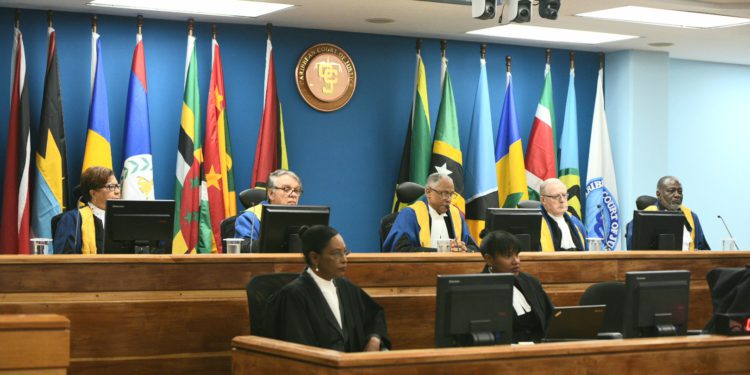Port of Spain, Trinidad. Representatives from around the region converged today at the Caribbean Court of Justice (CCJ) in Port of Spain, Trinidad and Tobago for a Ceremonial Sitting to commemorate the retirement of one of its earliest sworn-in judges, the Honourable Mr. Justice David Hayton, who will retire from the Court in July. In his remarks at the event, Mr. Justice Hayton said that it was “an absolute honour, a privilege and a delight working in the CCJ these last 14 years.”
He further noted that “It is, of course, a very privileged position to be on the CCJ Bench to serve Caribbean peoples, whether pursuant to the Court’s central Original Jurisdiction role, to flesh out and to police the skeleton structure of the Revised Treaty of Chaguaramas. Also, pursuant to the Court’s extensive role in the Appellate Jurisdiction, to develop the domestic laws of CARICOM member states as most appropriate to the circumstances of those States. Both Jurisdictions should contribute to developing the wealth and happiness of Caribbean peoples under the rule of law promoted in the constitutions of CARICOM States.”
He also noted that, apart from its judicial work, the CCJ played a special role in the efforts to improve the delivery of justice in the region. Using the opportunity to list initiatives conducted by the Court through the Judicial Reform and Institutional Strengthening (JURIST) Project, the retiring judge highlighted initiatives such as “the development of Model Guidelines for the Treatment of Sexual Offences, the setting up of a Sexual Offences Model Court in Antigua & Barbuda and the provision of a Criminal Magisterial Bench Book for the region. CCJ Judges have also led training programmes in the region as to civil procedure rules and processes for clearing backlogs of cases, while also encouraging the use of electronic filing systems in local courts”.
Presided over by the CCJ President, the Honourable Mr Justice Adrian Saunders, the proceedings included submissions by judges, attorneys, academics and members of the CCJ staff. Described by many of the presenters as an “intellectual giant”, Mr Justice Saunders noted that “Mr Justice Hayton’s dedication to legal scholarship and his in-depth knowledge in these areas made him a jurist of international repute.”
This sentiment was echoed in many of the other presentations throughout the event as he was lauded for his many contributions to the study of law particularly in the area of trusts and his work as a CCJ judge in promoting the rule of law in the Caribbean. Similarly, the Rt. Hon. Lady Mary Arden of Heswall, DBE, Justice of the Supreme Court of the UK, noted that Mr Justice Hayton served as “author or editor for 15 books on issues of trust, properties, succession and tax laws” and described him as “the world’s expert on cross border issues relating to trust.”
Professor Rose-Marie Belle Antoine, Dean of the Faculty of Law at the University of the West Indies, St Augustine noted when Mr. Justice Hayton was appointed in 2005 at the inception of the Court that he “was no token foreign judge. Hayton came to us at the very top of his field, having been promoted to the rank of Professor at Kings College, a rank reserved for the heights of academic excellence in the UK, as in the West Indies and with an international consultancy base, practice and the leading author on domestic trust law.”
Additional submissions were made by The Hon. Mr. Justice Paul Matthews, King’s College London & Co- editor of Underhill & Hayton: Law of Trusts and Trustees; Dr. David Berry, Dean of the Faculty of Law, University of the West Indies, Cave Hill Campus & University Dean of Law; Dr. Peter Maynard, Attorney at Law, Peter D. Maynard Counsel & Attorneys; Mrs. Jacqueline Graham, Registrar and Chief Marshal of the CCJ; Mr. Elton Prescott, SC, Commissioner of the Regional Judicial and Legal Services Commission, and Mr. Oscar Peters, Driver/Usher of the Caribbean Court of Justice.









